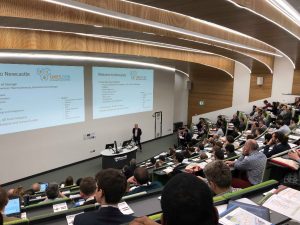CESI PhD researcher, Natalia-Maria Zografou-Barredo, recently attended the fourth UK Energy Storage Conference in Newcastle. In this week’s blog, she takes us through the presentations that took place and summarizes her thoughts on the conference.
About the author 
Natalia-Maria Zografou-Barredo is a PhD researcher at Newcastle University and works with the EPSRC National Centre for Energy Systems Integration (CESI). Her research focuses on multi-energy systems and microgrid operation.
Contact details: n.zografou-barredo2@newcastle.ac.uk
I recently attended the fourth UK Energy Storage Conference (UKES) held on the 20-22 March 2018. This year it took place in Newcastle in the Urban Sciences Building, and attendance was over 200. A consortium of speakers from academia, industry and policy within the UK and around the world joined the conference.
Presentations provided a holistic view of ongoing research on energy storage and portrayed energy storage as a significant asset in future energy systems. Main subjects covered included:
- Policy and economics of energy storage systems
- Operation and control
- Demonstration and commercial deployment
- Design, planning and integration of storage in energy systems
- Energy storage for Future Mobility
- Energy storage in the built environment
- Thermal, mechanical, and thermochemical energy storage
- Electrochemical energy storage
- Gas storage
I attended different sessions. Nonetheless, presentations during the ‘Demonstration and commercial deployment’ session drew my attention due to some interesting questions and fruitful discussions between the speakers and the audience.
Presentations during this session covered both technical and social matters around energy storage. However, questions posed to the panel were almost exclusively around social acceptance of the future changes related to energy storage. And for good reason.
Electrical energy systems do not represent a ‘passive’ one-directional (i.e. from electrical energy production to consumption) system anymore. It is a fact that energy storage deployment (electric vehicles, demand-side management, energy storage in smart grids & microgrids, etc.) not only affects public life, but also depends on a mutual public cooperation.
Discussions during this session brought to realization that the implementation of future research on energy storage after ‘solving’ any technical challenges should potentially be on how to face (and maybe prevent) social ones. It was concluded that public cooperation poses an additional challenge in the integration of energy storage to future energy systems (apart from any existing techno-economic issues raised on other conference sessions).
Overall, the conference portrayed energy storage as a vital asset in future energy systems. The majority of speakers indicated the value of ongoing research of energy storage systems in order to face the challenges from a technical point of view. Nonetheless, public cooperation seems to be yet another important challenge in the deployment of energy storage systems & technologies that should be addressed in the near future.

UKES Conference Opening Plenary
Keynote speaker – Prof Phil Taylor, Newcastle University
References
“UK Energy Storage Conference,” [Online]. Available: http://ukenergystorage.co/.

